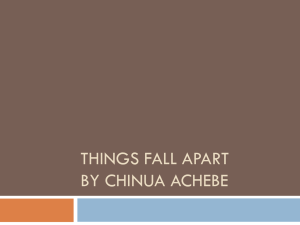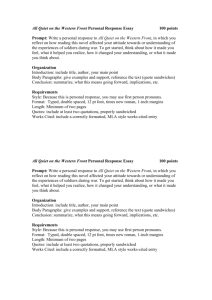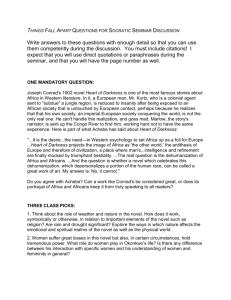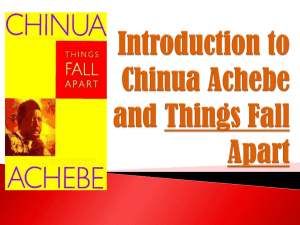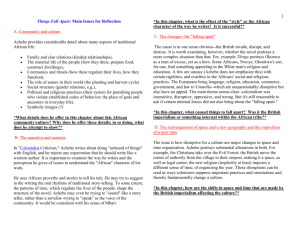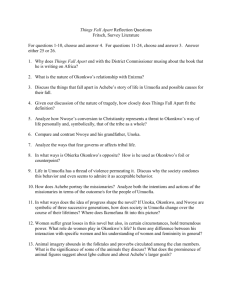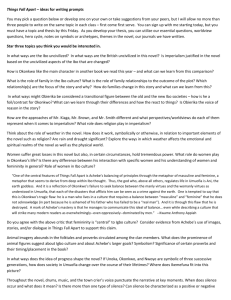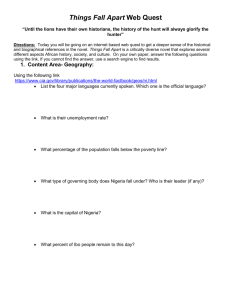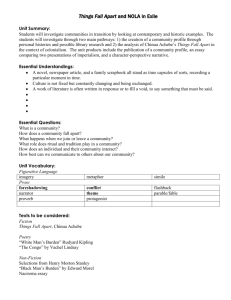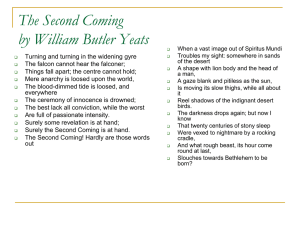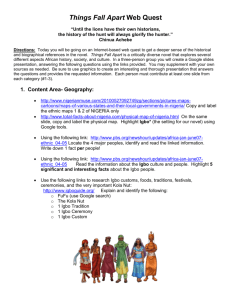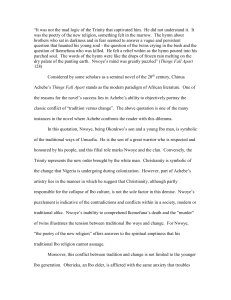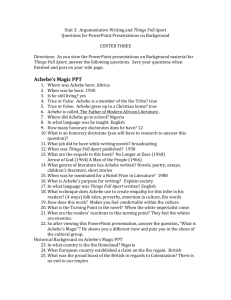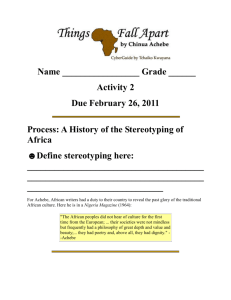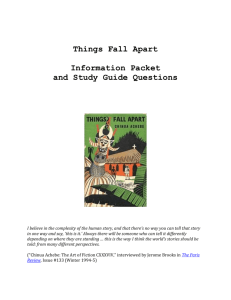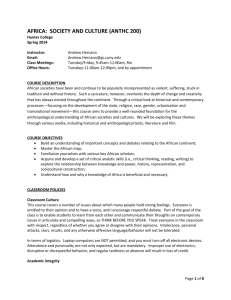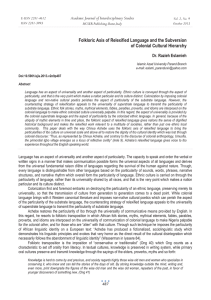Things Fall Apart Lesson Plan Day 2.doc
advertisement
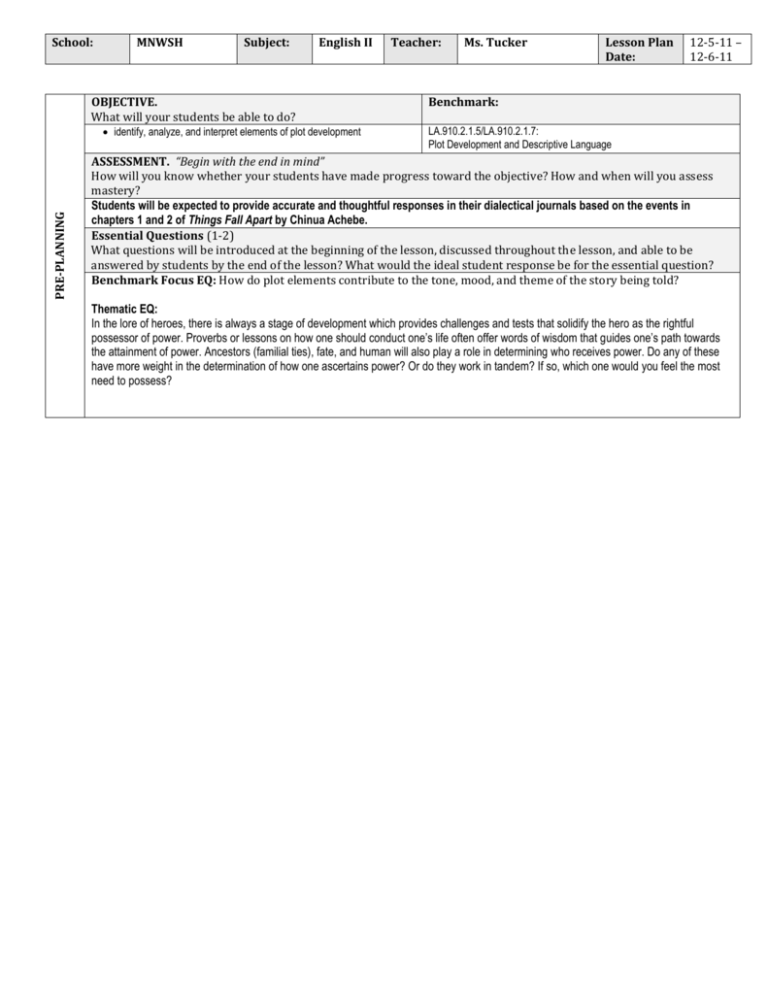
School: MNWSH Subject: English II OBJECTIVE. What will your students be able to do? PRE-PLANNING identify, analyze, and interpret elements of plot development Teacher: Ms. Tucker Lesson Plan Date: 12-5-11 – 12-6-11 Benchmark: LA.910.2.1.5/LA.910.2.1.7: Plot Development and Descriptive Language ASSESSMENT. “Begin with the end in mind” How will you know whether your students have made progress toward the objective? How and when will you assess mastery? Students will be expected to provide accurate and thoughtful responses in their dialectical journals based on the events in chapters 1 and 2 of Things Fall Apart by Chinua Achebe. Essential Questions (1-2) What questions will be introduced at the beginning of the lesson, discussed throughout the lesson, and able to be answered by students by the end of the lesson? What would the ideal student response be for the essential question? Benchmark Focus EQ: How do plot elements contribute to the tone, mood, and theme of the story being told? Thematic EQ: In the lore of heroes, there is always a stage of development which provides challenges and tests that solidify the hero as the rightful possessor of power. Proverbs or lessons on how one should conduct one’s life often offer words of wisdom that guides one’s path towards the attainment of power. Ancestors (familial ties), fate, and human will also play a role in determining who receives power. Do any of these have more weight in the determination of how one ascertains power? Or do they work in tandem? If so, which one would you feel the most need to possess? Higher Order Questions (3-5) What questions will be answered to provoke higher order thinking and include Moderate to High FCAT Complexity Levels? What would the ideal student response be for each question? General introduction to the novel: Things Fall Apart, published in 1958, is the seminal African novel in English. Although there were earlier examples, notably by Achebe's fellow Nigerian, Amos Tutuola, none has been so influential, not only on African literature, but on literature around the world. Its most striking feature is to create a complex and sympathetic portrait of a traditional village culture in Africa. Achebe is trying not only to inform the outside world about Ibo cultural traditions, but to remind his own people of their past and to assert that it had contained much of value. All too many Africans in his time were ready to accept the European judgment that Africa had no history or culture worth considering. He also fiercely resents the stereotype of Africa as an undifferentiated "primitive" land, the "heart of darkness," as Conrad calls it. Throughout the novel he shows how African cultures vary among themselves and how they change over time. Look for instances of these variations as you read. As a young boy the "African literature" he was taught consisted entirely of works by Europeans about Africa, such as Conrad's Heart of Darkness and Joyce Cary's Mister Johnson, which portrays a comic African who slavishly adores his white colonist boss, to the point of gladly being shot to death by him. Achebe has said that it was his indignation at this latter novel that inspired the writing of Things Fall Apart. Try to see in what ways his novel answers Cary's. He also wrote a famous attack on the racism of Heart of Darkness which continues to be the subject of heated debate. The language of the novel is simple but dignified. When the characters speak, they use an elevated diction which is meant to convey the sense of Ibo speech. This choice of language was a brilliant and innovative stroke, given that most earlier writers had relegated African characters to pidgin or inarticulate gibberish. One has the sense of listening to another tongue, one with a rich and valuable tradition. Chapter One: Note how Achebe immediately establishes his perspective from inside Umuofia (which is Ibo for "people of the forest") in the first sentence. The wider world consists of the group of nine related villages which comprise Umuofia and certain other villages like Mbaino. What are Okonkwo's main characteristics as he is depicted in the first few chapters? List as many as you can, being as specific as possible. What were the characteristics of his father which affect him so powerfully? Kola is a stimulant, comparable to very strong tea or coffee, which is served on most social occasions in this culture. It is also one ingredient after which Coca Cola is named. Note how the ritual for sharing kola is described without being explained. Why do you think Achebe does this? He will continue to introduce Ibo customs in this fashion throughout the novel. One becomes influential in this culture by earning titles. As with the Potlatch Indians of the American Northwest and many other peoples, this is an expensive proposition which involves the dispersing most of one's painfully accumulated wealth. What do you think are the social functions of such a system? One of the most famous lines in the novel is "proverbs are the palm-oil with which words are eaten." What does this mean? Palm oil is a rich yellow oil pressed from the fruit of certain palm trees and used both for fuel and cooking. Look for other proverbs as you read. Cowry shells threaded on strings were traditionally used as a means of exchange by many African cultures. The villages' distance from the sea makes them sufficiently rare to serve as money. Cowries from as far away as Southeast Asia have been found in sub-Saharan Africa. Chapter Two What effect does night have on the people? What do they fear? How do they deal with their fear of snakes at night? Palm-wine is a naturally fermented product of the palm-wine tree, a sort of natural beer. What is the cause and nature of the conflict with Mbaino? Beginning with this chapter, trace how women are related to the religious beliefs of the people. What is the purpose of the taking of Ikemefuna? Note how Achebe foreshadows the boy's doom even as he introduces him. In what ways does Okonkwo overcompensate for his father's weaknesses? In what ways is he presented as unusual for his culture? What is his attitude toward women? Why does he dislike his son Nwoye so much? In this polygamous culture each household is enclosed in a compound. Each wife lives in a hut with her children, and the husband visits each wife in turn, though he has his own hut as well. Children are often cared for more or less communally. What do you think the advantages and disadvantages of this form of social structure are? What seems to be Achebe's attitude toward this culture so far? Is his depicting it as an ideal one? Can you cite any passages which imply a critical attitude? BELL RINGER Follow the Focus Calendar to provide reinforcement of previously taught skills. Students will create Gmail Account in Computer Lab TIME Approximate LESSON CYCLE 10 mins INTRODUCTION Brief part of the lesson when students learn the objective/essential question and how mastering the objective leads to achieving the bigger goal of the course. Provide a hook to motivate students and link to prior knowledge in order to introduce a new concept. Explain the relevance of lesson and the importance of learning the concept Introduce important vocabulary using the word wall as an interactive learning tool Anticipation Guide: (see attachment) Vocabulary: Chapter One Chapter Two improvident – rash, careless discerned – figured out kite – bird of prey imperious - domineering impending – upcoming emissary -- ambassador plaintive – sad capricious- impulsive prowess – strength harmattan – a hot, dry wind MODELING (“I DO”) Component of the lesson when teacher models to students exactly what they are expected to do during guided practice and eventually during independent work. Conduct a think aloud while modeling the steps to completing an activity or solving a problem Model the use of graphic organizer Use questioning techniques such as re-directing, wait-time and prompting Reading Strategy: Fill in the Sentence Whole Group will read chapter one together and answer questions one and two. 5-10 mins 10-15 mins GUIDED PRACTICE (“WE DO”) Opportunity for student to work in pairs, trios and/or quads to practice what they were taught during the modeled portion of the lesson Incorporate the use of a collaborative strategy in small groups Encourage student accountable talk during group discussion Perform checks for understanding Reading Strategy: Fill in the Sentence Whole Group will read chapter one together and answer questions three and four. INDEPENDENT PRACTICE (“YOU DO”) Differentiate your instruction to reach the diversity of learners in your classroom Assign students independent work that is directly aligned with the “I Do” and “We Do” portions of the lesson. Conduct Center Rotations Circulate around the room to provide individual support Pull small groups or individuals for more intensive support Students will be responsible for reading chapter two independently and answering all questions. Teacher Directed: Dialectical Journal (continued) Independent: Dialectical Journal (continued) Technology: Accelerated Reader Quiz 15-25 mins 10-15 min CLOSURE Wrap up the lesson and help students organize the information learned into a meaningful context. Have students reflect on or answer the Essential Question Help students connect today’s learning to their bigger goal in the course See Essential Question 5 mins HOME-LEARNING How will students practice what they learned? How will opportunities be provided for students to maintain mastery of previously mastered skills/concepts? Complete Article Review Questions; Browse Teacher website for background on novel
